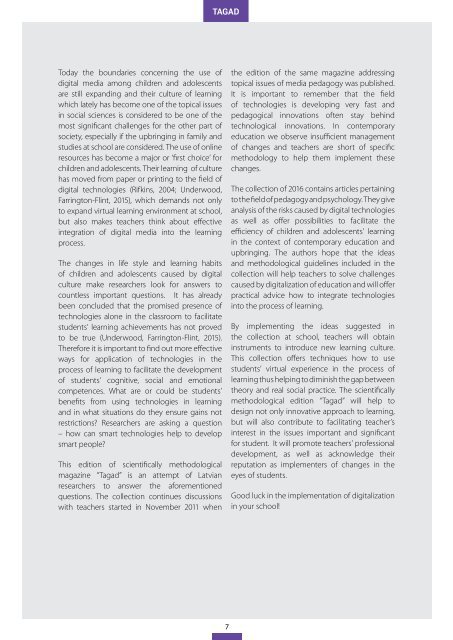TAGAD
Tagad_10_16
Tagad_10_16
You also want an ePaper? Increase the reach of your titles
YUMPU automatically turns print PDFs into web optimized ePapers that Google loves.
<strong>TAGAD</strong><br />
Today the boundaries concerning the use of<br />
digital media among children and adolescents<br />
are still expanding and their culture of learning<br />
which lately has become one of the topical issues<br />
in social sciences is considered to be one of the<br />
most significant challenges for the other part of<br />
society, especially if the upbringing in family and<br />
studies at school are considered. The use of online<br />
resources has become a major or ‘first choice’ for<br />
children and adolescents. Their learning of culture<br />
has moved from paper or printing to the field of<br />
digital technologies (Rifkins, 2004; Underwood,<br />
Farrington-Flint, 2015), which demands not only<br />
to expand virtual learning environment at school,<br />
but also makes teachers think about effective<br />
integration of digital media into the learning<br />
process.<br />
The changes in life style and learning habits<br />
of children and adolescents caused by digital<br />
culture make researchers look for answers to<br />
countless important questions. It has already<br />
been concluded that the promised presence of<br />
technologies alone in the classroom to facilitate<br />
students’ learning achievements has not proved<br />
to be true (Underwood, Farrington-Flint, 2015).<br />
Therefore it is important to find out more effective<br />
ways for application of technologies in the<br />
process of learning to facilitate the development<br />
of students’ cognitive, social and emotional<br />
competences. What are or could be students’<br />
benefits from using technologies in learning<br />
and in what situations do they ensure gains not<br />
restrictions? Researchers are asking a question<br />
– how can smart technologies help to develop<br />
smart people?<br />
This edition of scientifically methodological<br />
magazine “Tagad” is an attempt of Latvian<br />
researchers to answer the aforementioned<br />
questions. The collection continues discussions<br />
with teachers started in November 2011 when<br />
the edition of the same magazine addressing<br />
topical issues of media pedagogy was published.<br />
It is important to remember that the field<br />
of technologies is developing very fast and<br />
pedagogical innovations often stay behind<br />
technological innovations. In contemporary<br />
education we observe insufficient management<br />
of changes and teachers are short of specific<br />
methodology to help them implement these<br />
changes.<br />
The collection of 2016 contains articles pertaining<br />
to the field of pedagogy and psychology. They give<br />
analysis of the risks caused by digital technologies<br />
as well as offer possibilities to facilitate the<br />
efficiency of children and adolescents’ learning<br />
in the context of contemporary education and<br />
upbringing. The authors hope that the ideas<br />
and methodological guidelines included in the<br />
collection will help teachers to solve challenges<br />
caused by digitalization of education and will offer<br />
practical advice how to integrate technologies<br />
into the process of learning.<br />
By implementing the ideas suggested in<br />
the collection at school, teachers will obtain<br />
instruments to introduce new learning culture.<br />
This collection offers techniques how to use<br />
students’ virtual experience in the process of<br />
learning thus helping to diminish the gap between<br />
theory and real social practice. The scientifically<br />
methodological edition “Tagad” will help to<br />
design not only innovative approach to learning,<br />
but will also contribute to facilitating teacher’s<br />
interest in the issues important and significant<br />
for student. It will promote teachers’ professional<br />
development, as well as acknowledge their<br />
reputation as implementers of changes in the<br />
eyes of students.<br />
Good luck in the implementation of digitalization<br />
in your school!<br />
7


